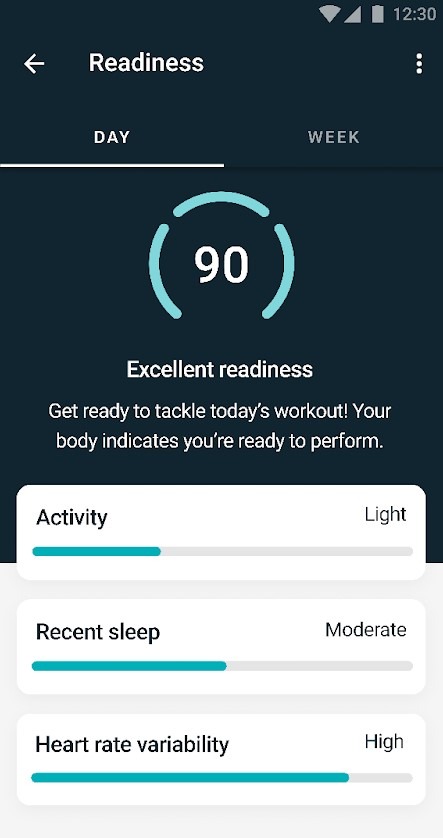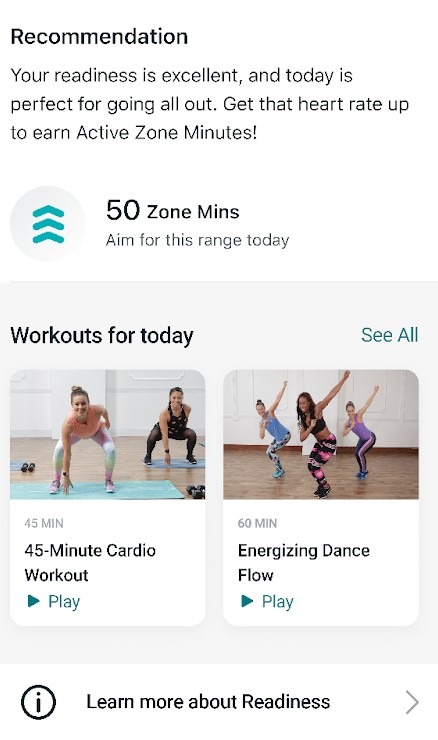Fitbit Daily Readiness Tells You When Your Body Is Ready For That Workout
Today, Fitbit announced a new feature for its Premium users that should help them determine when their body is ready for intense workouts or when it might need more time to recuperate from fatigue. The feature is called Fitbit Daily Readiness, and it uses algorithms to figure out users' "Fitness Fatigue" score. The hope is that it will let users know when they're ready to work out again and keep them from straining their bodies when fatigue from poor sleep and previous activity is still too high.
How Fitbit Daily Readiness works
Fitbit's Daily Readiness feature is pretty straightforward, though you wouldn't necessarily think that an algorithmic system for figuring out fitness fatigue would be. Every morning, Fitbit will give users their Fitness Readiness Score, which considers three different things: recent activity, sleep quality, and heart rate variability.
In a blog post today, Fitbit says that your recent activity is judged by tracking elevated heart rate throughout the day. This, essentially, means that all activity that results in a high heart rate will count toward this score, even if it isn't explicit exercise.

Your sleep score, meanwhile, doesn't just consider the quality of sleep you got the previous night, but your sleep quality from the nights before as well. Fitbit notes that since sleep's effects on the body are cumulative, an approach where Daily Readiness considers multiple nights of sleep is best for determining whether or not users are ready for an intense workout.
Finally, we have heart rate variability, which doesn't measure beats per minute but rather the time between individual heartbeats. Somewhat contrary to heart rate tracking, Fitbit says that a high heart rate variability is good because it means the "body can easily transition from rest to activity and back." Heart rate variability isn't a static thing and can be influenced by several factors, so it can have a shifting impact on whether or not someone is ready to work out.
The Daily Readiness Score
Fitbit says that it will measure those three factors for Premium users each morning and give them a Daily Readiness Score. Not only will users get a numeric score, but they'll be put into three categories: Excellent, Good, and Low. With Excellent readiness, Fitbit will recommend that users push themselves during their workouts that day. In contrast, those with Good readiness will be told to take on "moderate exercise" or their daily workouts.

Low readiness means that the user's body is still fatigued, and they should probably focus more on resting than getting a workout in. For those with Excellent and Good readiness, Fitbit will recommend Premium workouts users can participate in, along with giving them an Active Zone Minutes goal for their workout. Those who get a Low readiness rating, on the other hand, will receive recommendations for recovery.
The central idea behind all of this is to help ensure that people work out when it's most beneficial for their bodies while not pushing things while they are still fatigued. While listening to your body is probably still a good rule of thumb, even with these Daily Readiness scores, it sounds like these scores can give you insight into whether or not you're truly ready for an intense workout.
It seems that everything about this feature is locked behind a Fitbit Premium subscription, so while Daily Readiness does sound useful, it's going to require $9.99 a month or $79.99 a year to access. Daily Readiness scores are going live beginning today and support Fitbit Sense, Versa 3, Versa 2, Inspire 2, Luxe, and Charge 5, so Premium users with those devices on their wrists should keep an eye out for the new feature.
